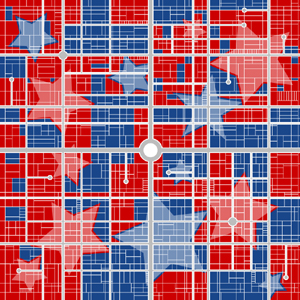Top state court withdraws December opinion, rules it can’t interfere with partisan gerrymanders

Image from Shutterstock.
The North Carolina Supreme Court ruled 5-2 Friday that challenges to partisan gerrymandering by the legislature—the process of drawing voting district lines based on political considerations—can’t be considered by the courts.
Partisan gerrymandering claims “present a political question that is nonjusticiable under the North Carolina Constitution,” the state supreme court said in its April 28 opinion.
The state supreme court withdrew a prior opinion to the contrary that struck down gerrymandered partisan maps of federal congressional and state legislative districts. That prior opinion was issued in December 2022, when the North Carolina Supreme Court had a majority of Democratic justices. Following elections, the state supreme court now has a majority of Republican justices.
The New York Times called the about-face “a highly unusual move, particularly on a pivotal constitutional issue in which none of the facts had changed.”
“To some legal experts,” the New York Times reported, “the legal reasoning was overshadowed by a different message: That in politically charged cases, the deciding factor increasingly is not the law or legal precedent but which party holds the majority on the court.”
Politico, Law360 and the Election Law Blog were among the other publications that covered the decision.
The decision, Harper v. Hall, will direct the GOP-majority legislature to redraw the maps, potentially giving Republicans at least three more seats in the U.S. House of Representatives, according to the New York Times. Currently, the state’s congressional delegation has seven Republicans and seven Democrats, the results of a November election based on a map drawn by a court-appointed special master.
The U.S. Supreme Court had ruled in June 2019 that federal courts have no authority to decide claims of partisan gerrymandering. Another partisan gerrymandering case before the Supreme Court—which also involves North Carolina voting maps—argues that state supreme courts can’t get involved in partisan gerrymandering either.
The argument is based on the “independent state legislature” theory. The theory’s proponents argue that the Constitution’s elections clause in Article I bars state courts from interfering with electoral maps adopted by state legislatures. The clause provides that “the times, places and manner of holding elections for senators and representatives shall be prescribed in each state by the legislature thereof.”
The new decision by the North Carolina Supreme Court in Harper v. Hall could make the Supreme Court case moot, according to the Election Law Blog post by Rick Hasen, a professor at the University of California at Los Angeles School of Law.
If so, the Supreme Court will likely agree to hear an Ohio case raising similar issues, Hasen wrote.



